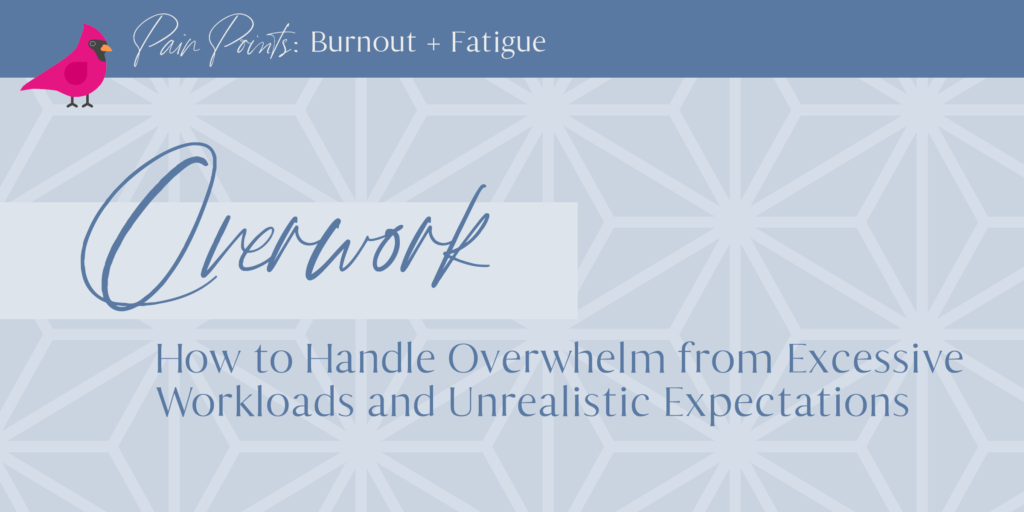
As a high-achiever, you’re no stranger to hard work. You’re the one who goes the extra mile, takes on challenges head-on, and strives for excellence in everything you do. But when the workload feels like it’s never-ending and expectations keep piling up, it’s easy to feel overwhelmed, stressed, and exhausted. Overwork is a major contributor to burnout and fatigue, and it’s something many high-achieving professionals face.
If this sounds familiar, it’s time to take a step back and reassess. Your well-being is more important than any deadline or project. Here are some strategies to help you manage your workload and prevent burnout:


You know that feeling when your to-do list seems impossible? It’s important for managers to work with you to set achievable goals and deadlines based on a realistic assessment of workload and capacity. This includes understanding the time and resources needed to complete tasks and adjusting expectations accordingly. Equally, it’s up to you, as a professional, to advocate for yourself and commit to only those things that are realistic given the time and resources available to you. Alignment between yourself and your manager when setting objectives and goals is absolutely essential.
Why It Helps: When goals are clear and realistic, you’re less likely to feel overwhelmed by impossible expectations. This helps reduce stress and promotes a more balanced workload. It’s about making sure you have the time and space to do your best work without burning out.

It can be hard to keep track of everything on your plate. Using project management and workload tracking tools like Trello, Asana, or Microsoft Planner, or Microsoft Teams can help you and your team visualize tasks, prioritize effectively, and allocate resources efficiently. These tools help distribute tasks evenly among team members, so no one is carrying more than their fair share.
Why It Helps: Visualizing your workload can prevent over-assignment of tasks and ensure that you’re not disproportionately burdened. It also fosters transparency and accountability within teams, making it easier to manage expectations and workloads.

When you’re feeling overwhelmed, it’s crucial to have a space where you can discuss your workload and stress levels openly. A culture that encourages regular check-ins and honest conversations about workload can help you identify when you’re feeling overloaded and allow for timely adjustments or support.
Why It Helps: Open communication helps managers recognize when you’re at risk of overwork and provides an opportunity to redistribute tasks, adjust deadlines, or offer additional support. It’s all about making sure you have what you need to succeed without burning out.

Sometimes it feels like you’re always “on,” especially if you’re working remotely. Encouraging a healthy work-life balance means setting boundaries between work and personal life. This could be avoiding work-related communications after hours, taking regular breaks throughout the day, or implementing flexible working hours to accommodate personal needs.
Why It Helps: A healthy work-life balance helps you recharge and prevents burnout by ensuring you have time to rest and attend to personal commitments. Remember, you’re not just an employee; you’re a whole person with a life outside of work.

There’s nothing like feeling appreciated for the hard work you put in. When your efforts are recognized—whether through public recognition, bonuses, or additional time off—it can motivate you and help you feel valued. As a team player, be sure to recognize your own colleagues and team members frequently through informal channels. A quick compliment by chat or email can go a long way in lifting spirits and strengthening relationships.
Why It Helps: Feeling appreciated boosts morale and reduces the negative effects of overwork. When you know your efforts are recognized, you’re more likely to feel satisfied and less stressed.

Sometimes, it’s not about working harder but working smarter. Participating in workshops or training sessions focused on improving time management, task prioritization, and efficiency can help you focus on high-impact tasks and learn how to delegate or eliminate low-priority work. Are you a productivity enthusiast like me? Why not volunteer to host a few virtual training sessions for your colleagues? They’ll be grateful and you’ll enjoy more efficient response times from your work friends!
Why It Helps: Improving time management skills helps you work more efficiently, reducing the likelihood of feeling overwhelmed by your workload. It’s about finding ways to make your work more manageable and less stressful.


It’s easy to let work spill over into your personal life, but it’s crucial to define clear work hours and make a conscious effort to disconnect during your personal time. Avoid checking emails or working outside of designated hours, and communicate these boundaries to colleagues and managers. Leave that laptop in a drawer if you need to!
Why It Helps: Setting boundaries helps protect your personal time and prevents work from encroaching on life outside the office. It’s about giving yourself the space to recharge and come back to work refreshed.

When you’re feeling stressed, taking a moment to breathe can make all the difference. Incorporating mindfulness practices like meditation, deep breathing, or yoga into your daily routine can help manage stress and improve focus. Taking regular breaks to step away from work can also help maintain mental clarity.
Why It Helps: Mindfulness and stress management techniques help you stay grounded and reduce the physical and mental toll of overwork, enhancing overall well-being. It’s about finding peace amidst the chaos.

You can do anything, but you can’t do everything. And you certainly can’t do it all at once! At the start of each day or week, create a list of tasks and prioritize them based on urgency and importance. Focus on completing high-priority tasks first and consider delegating or postponing less critical tasks. (Quick Tip – The 2-Minute Rule: If a task takes less than 2 minutes – stop and DO IT. Just be very disciplined and only do this when it really is less than 2 minutes.)
Why It Helps: Prioritizing tasks helps manage your workload more effectively, reducing the feeling of being overwhelmed and improving productivity. It’s about working smarter, not harder.

You’re used to taking on challenges, but sometimes, saying no is the best thing you can do for yourself. Evaluate your current workload before agreeing to take on additional tasks. Politely decline new assignments if they will overextend you or interfere with your ability to complete existing responsibilities effectively.
Why It Helps: Saying no when necessary helps maintain a manageable workload and prevents burnout by ensuring you’re not taking on more than you can handle. It’s about knowing your limits and respecting them.

You don’t have to handle everything on your own. If you’re feeling overwhelmed, reach out for guidance from your manager, colleagues, or a mentor. Discuss your workload and explore possible solutions, such as task delegation, timeline shifts, or additional resources.
Why It Helps: Seeking guidance helps prevent burnout by addressing workload issues early and ensuring you have the necessary resources to manage your responsibilities effectively. It’s about recognizing when you need guidance or clarity and asking for it.

It’s easy to get caught up in doing more, but sometimes, less is more. Shift your mindset from focusing on quantity to quality. Instead of measuring success by how much you accomplish, consider the impact and quality of your work. Celebrate small victories and progress, and acknowledge the value of your efforts.
Why It Helps: Reframing your perspective helps reduce the pressure to overperform and encourages a healthier approach to work, promoting long-term well-being and satisfaction. It’s about finding fulfillment in what you do, not just how much you do.

Addressing overwork is a team effort. By implementing these strategies, both you and your organization can create a more balanced, sustainable work environment that prioritizes well-being and prevents burnout. Remember, it’s not just about getting things done; it’s about maintaining quality of work and life and taking care of yourself along the way.
You’re more than your work. Your health and happiness matter most. Take steps today to reclaim your balance and thrive both personally and professionally.
✨Boldly go,


Leave a Reply